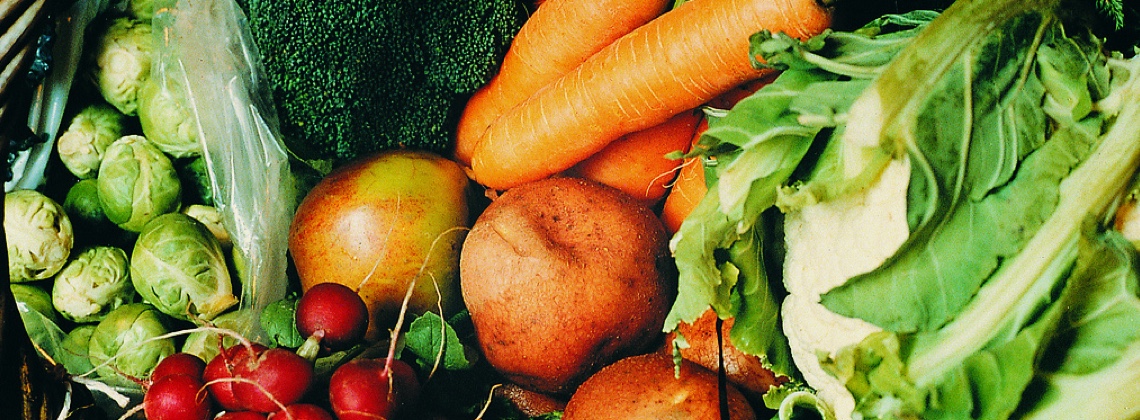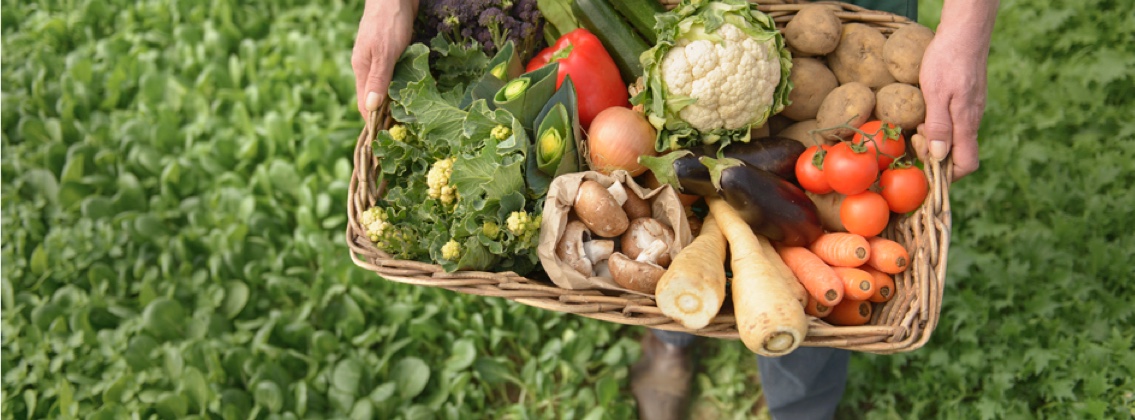Our guide to finding sustainably grown produce will tell you all you need to know about feasting on the freshest fruit and vegetables.
With our supermarkets offering so much variety when it comes to fruit and veg, it can be tough to tell how to make sustainable choices. With that in mind, we’ve spoken to the UK’s largest organic certification body, The Soil Association, as well as two of the most popular fruit and veg box suppliers to get the lowdown on selecting seasonal, sustainable produce for all occasions. Once you know how to select the freshest, most sustainable produce make the most of it by preparing it to perfection on a Leisure range cooker.
As consumers, how can we make sure the fruit and vegetables we are buying are good quality and come from a sustainable source?

© The Soil Association
The Soil Association is a registered charity and the largest organic certification body in the UK. They work on issues that include opposition to intensive farming practices and supporting local purchasing, as well as educating people on nutrition and certifying organic food.

Buy seasonal products. If food is in season, that means it can be grown locally and therefore has a lower carbon footprint than out of season foods that have to be imported.
Growing your own fruit and vegetables is a great way to be certain of what you are eating and where it came from. Growing on a small scale has a low impact on the environment and reduces waste.

© The Soil Association

Where you can, support local growers. The carbon footprint of local growers is often lower than that of larger brands as the transportation of products is on a local, smaller scale.
The Soil Association website has a ‘Find Your Local Independent Retailer’ tool that will search for accredited suppliers in your local area. There is also a ‘Find a Box Scheme’ which will search for local providers of organic, seasonal fruit and vegetables that can be delivered to your home.

© Riverford
Riverford is a UK-wide organic veg box scheme who work directly with growers and producers. Offering a variety of different weekly veg boxes, including recipe boxes, they deliver to around 47,000 homes weekly from the regional organic farms they run themselves.

Avoid air-freighted fruit
Check the label for country of origin and if you are buying non-UK fruit from more sunny climates, investigate and choose companies that import via road and sea. Air freight causes 40-50 times the CO2 emissions of transporting fruit and veg by sea.
Buy direct from the grower
They will know their land and produce, and you get to know exactly what is at its best throughout the year. Fruit and veg boxes from Riverford, showcase seasonal varieties and really celebrate seasonal produce like UK asparagus and cherries, alongside more unusual veg like samphire and wild garlic. Eating with the seasons means you have a colourful plate, the best flavour and a diverse diet year-round.



Know your food’s journey from ‘field to fork’
- Ask lots of questions and a good supplier will always know the answer!
- We think that small-scale organic family farms are the most sustainable way of producing food. All our suppliers look after their soil, livestock and wildlife by farming respectfully and in tune with nature.

© The Organic Pantry
Based in the north-east of England, The Organic Pantry delivers award-winning fruit and veg boxes. Organic Pantry staff regularly visit farmers markets to sell locally grown produce from the family-owned farm.\

The UK fruit season is relatively short and although certain hardier fruits such as apples and pears can be stored over winter, the majority have a short shelf life making availability outside the peak summer months scarce. If you do want to be more sustainable, our tips would be:

Grow your own
As always, this is the key to sustainability – vegetables grow best at certain times of the year, responding to certain environmental stimuli to kick off the next phase of their lifecycle. If something has been forced to grow out of season it is likely that lots of energy (such as heating) has gone into its production.
The UK climate might not suit tropical fruits, but it is great for apples, plums, cherries and berries that can see you through the summer. Seasonal produce is likely to be grown more naturally than forced crops while minimising your food miles with local purchases will also result in a less negative impact on your environment.
Shop smarter
Make friends with your freezer. If you can’t live without fruits through the winter, then try freezing locally grown produce during the abundant months. Freezers may be an extra expense, but they are more eco-friendly than extra trips to the shops!
How to check for seasonal produce
- Colour vibrancy: is it the bright colour you would expect?
- Hydration levels: leaves should be crisp and skin surfaces of fruit smooth and unwrinkled
- Scent: not everything has a strong smell when raw but fruits like melons and pineapples will always have the strongest smell when they are at their peak levels of ripeness
If you want to know more, Eat the Seasons is a good place to learn about the seasonality of fresh produce.
Box schemes are a great way to conveniently get sustainably grown veg delivered straight to your door. Nearly all independent farms will offer a farm grown or locally grown box.
Supermarkets are being pushed to display produce provenance, so if you don’t want to shop at a local farmer’s market or get your fresh produce delivered you can look for labels on packaging to find out where the product originates from.
Have a look for your local FARMA market, an organisation that can help you find suppliers or markets that are local to your area. You could also get advice from the Soil Association about local organic schemes and suppliers.
What labels should I look out for on fruit and vegetables?
There are a few labels used on milk and other dairy products that we can look for to make sure we are buying dairy from a sustainable source.

Linking Environment and Farming (LEAF) logo: This shows produce has been grown in an environmentally responsible way.

Soil Association logo: This is the main certified organic logo in the UK. They run a certification program which is constantly being updated to modify the rules and regulations for organic produce.